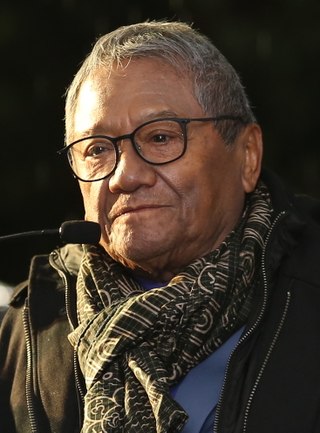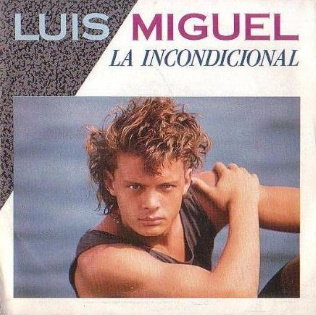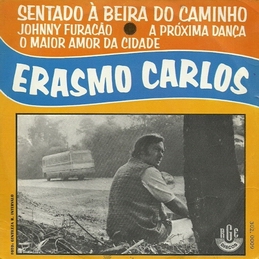Related Research Articles

Menudo is a Puerto Rican boy band formed by producer Edgardo Díaz. Referred to as the "Most Iconic Latino Pop Music Band", Menudo has been ranked as one of the biggest boy bands of all time by several publications, including Billboard, Us Weekly, Seventeen, and Teen Vogue, being the only Latin band on their lists.

Roberto Carlos Braga is a Brazilian singer-songwriter, also known as "King of Latin Music" or simply "the King". Most of his songs were written in partnership with his friend, singer and songwriter Erasmo Carlos. Roberto Carlos has sold over 70 million albums around the world. He is considered one of the most influential artists in Brazil, being cited as a source of inspiration by many artists and bands. His net worth is estimated at US$160 million.

Erasmo Carlos was a Brazilian singer and songwriter, most closely associated with his friend and longtime collaborator Roberto Carlos. Together, they created many chart hits including "É Proibido Fumar", "Sentado à beira do caminho", "Além do Horizonte", "Amigo" and "Festa de Arromba".

Desafío de Estrellas is a Mexican musical show produced and distributed by TV Azteca, the second most important network in the country. The format of the Desafío is similar to American Idol with contestants eliminated every week and a grand finale with the top contestants competing to win the first place prize. TV Azteca has, until 2006, produced two versions of the program, one in 2003 and the other in 2006. The 2003 version consisted only of former contestants of La Academia, another TV Azteca-produced show which had already garnished two seasons and, in the process, taken away rating from Televisa, the prime network of the country. The 2006 version, on the other hand, consisted of both former contestants of La Academia, as well as other artists produced by TV Azteca in the middle and late '90s, later in 2009 a third season took place with former contestants of the six seasons of la academia.
"Manhã de Carnaval", often referred to as "Black Orpheus", is a song by Brazilian composer Luiz Bonfá and lyricist Antônio Maria.
Parchís was a children's music group from Spain which enjoyed great success in the Spanish-speaking world in the 1980s. Their significance in Hispanic popular culture comes from being perceived as an archetype of this type of band at the time. Parchís' original five members were Constantino Fernández Fernández, Yolanda Ventura Román, Oscar Ferrer Cañadas, Gemma Prat Termens, and David Muñoz Forcada. After several line-up changes, the group disbanded in 1985 with various members continuing successful careers in the world of entertainment.
"You Belong to My Heart" is the name of an English-language version of the Mexican Bolero song "Solamente una vez". This song was composed by Mexican songwriter Agustín Lara and originally performed by singer Ana María González and tenor José Mojica in the 1941 film Melodías de América.

Armando Manzanero Canché was a Mexican musician, singer, composer, actor and music producer, widely considered the premier Mexican romantic composer of the postwar era and one of the most successful composers of Latin America. He received a Grammy Lifetime Achievement Award in the United States in 2014. He was the president of the Mexican Society of Authors and Composers.

Jovem Guarda was primarily a Brazilian musical television show first aired by Rede Record in 1965, although the term soon expanded to designate the entire movement and style surrounding it. The members of the program were singers who had been influenced by the American rock n' roll of the late 1950s and British Invasion bands of the 1960s, although the music often became softer, more naïve versions with light, romantic lyrics aimed at teenagers. They were Roberto Carlos, Erasmo Carlos and Wanderléa, with other bands and musicians appearing on the show as guests.

"La Incondicional" is a song written, produced, and arranged by Spanish musician Juan Carlos Calderón and performed by Mexican singer Luis Miguel. It was released in 1989 via WEA Latina as the third single from Miguel's sixth studio album, Busca una Mujer (1988). The song became his second #1 single on the Billboard Hot Latin Tracks chart after "Ahora Te Puedes Marchar" in 1987. The song broke several airplay records in Latin America, topping the charts in Mexico, Chile and Peru; and the top-ten in other countries. The success of the song helped push the album to #3 on the Billboard Latin Pop Albums with approximate sales of four million units.

"El Triste" is a song written by Mexican composer Roberto Cantoral. It was performed for the first time on March 15, 1970, at the "Latin Song Festival II" by the Mexican singer José José. El Triste was included on his third studio album.

The rondalla is an ensemble of stringed instruments played with the plectrum or pick and generally known as plectrum instruments. It originated in Medieval Spain, especially in the ancient Crown of Aragon: Catalonia, Aragon, Murcia, and Valencia. The tradition was later taken to Spanish America and the Philippines. The word rondalla is from the Spanish ronda, meaning "serenade."
"Hasta Que Te Conocí" is a song by Mexican singer-songwriter Juan Gabriel. It was released in 1986 as the third single from his studio album Pensamientos. Written and produced by Gabriel, the song's lyrics focus on a protagonist learning the meaning of suffering after meeting a lover who mistreats him. It peaked at number two on the Billboard Hot Latin Song chart. A live version of the song was included on his album En el Palacio de Bellas Artes (1990) which peaked at number ten on the Hot Latin Songs chart.
Latin ballad is a sentimental ballad derived from bolero that originated in the early 1960s in Los Angeles, California and Southern California.

The 14th Annual Latin Grammy Awards was held on Thursday, November 21, 2013, at the Mandalay Bay Events Center in Las Vegas. This was the sixth time that Latin Grammys has been held at this location. The main telecast was broadcast on Univision at 8:00 PM EST.

The 15th Annual Latin Grammy Awards was held on November 20, 2014 at the MGM Grand Garden Arena in Paradise. This was the first time that Latin Grammys has been held at this location. The main telecast was broadcast on Univision at 8:00PM EST.
Events in the year 1955 in Mexico.

"Sentado à Beira do Caminho" is a Brazilian song composed by Roberto Carlos and Erasmo Carlos and released as a single in May 1969 by Erasmo Carlos.
This article includes an overview of the major events and trends in Latin music in the 1980s, namely in Ibero-America. This includes recordings, festivals, award ceremonies, births and deaths of Latin music artists, and the rise and fall of various subgenres in Latin music from 1980 to 1989.
This article includes an overview of the major events and trends in Latin music in the 1970s, namely in Ibero-America. This includes recordings, festivals, award ceremonies, births and deaths of Latin music artists, and the rise and fall of various subgenres in Latin music from 1970 to 1979.
References
- ↑ Mary Fisher; Humberto Quintero (3 November 1979). "Mexico, Steady growth extends music market leadership". BIllboard. Retrieved 13 December 2022.
- ↑ Romo, Edith (10 May 2022). "¿A quién se la dedica? Te contamos la historia de la canción "Amigo" de Roberto Carlos". UnoTv (in Spanish). Retrieved 13 December 2022.
- ↑ "Amigo by Roberto Carlos - Track Info". AllMusic. Retrieved 14 April 2023.
- ↑ "Roberto Carlos – Amigo / No Te Olvides De Mi". Discogs. 1977. Retrieved 14 April 2023.
- ↑ Eulich, Whitney. "Catholicism in Latin America: 5 key facts". The Christian Science Monitor. Retrieved 14 April 2023.
- ↑ ""Amigo", la canción que México hizo el Himno de Juan Pablo II". Desde la fe (in Spanish). 21 October 2019. Retrieved 14 April 2023.
- ↑ "Estudiantina Del Instituto Miguel Angel Y La Rondalla Infantil Del Colegio Mexico* – Amigo / Tema De La Estudiantina / Tu Eres Pedro / A La Virgen De Guadalupe". Discogs. 1979. Retrieved 14 April 2023.
- ↑ Rohter, Larry (15 April 2010). "Tour-Worthy Milestone for Brazil's Pop King". The New York Times. Retrieved 15 April 2023.
- ↑ "Billboard "Hits of the World"" (PDF). 8 April 1978. p. 76. Retrieved 5 December 2022.
- ↑ "Billboard "Hits of the World"". 5 May 1979. p. 73. Retrieved 10 December 2022.
- ↑ "Marc Anthony - Amar Sin Mentiras Album Reviews, Songs & More | AllMusic". AllMusic. Retrieved 15 April 2023.
- ↑ "Marc Anthony - Valio la Pena Album Reviews, Songs & More | AllMusic". AllMusic. Retrieved 15 April 2023.
- ↑ Derdeyn, Stuart (10 August 2004). "Ultra Sound" . The Province . p. B5. ProQuest 269382851 . Retrieved 15 April 2023.
- ↑ "Marc Anthony - Chart History: Tropical Airplay". Billboard. Retrieved 15 April 2023.
- ↑ "Alejandro Fernández, Chayanne y Marc Anthony cantaron JUNTOS en este concierto INÉDITO | VIDEO" (in Spanish). Terra. 22 December 2021. Retrieved 15 April 2023.